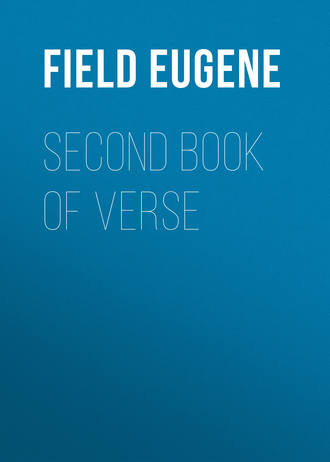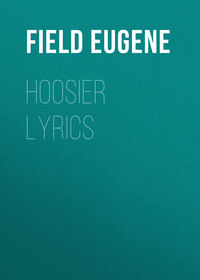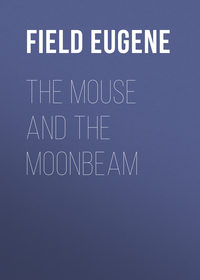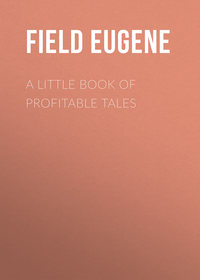Second Book of Verse
 полная версия
полная версияSecond Book of Verse
Жанр: зарубежная поэзиязарубежная классиказарубежная старинная литературастихи и поэзиялитература 19 векасерьезное чтениеcтихи, поэзия
Язык: Английский
Год издания: 2017
Добавлена:
Настройки чтения
Размер шрифта
Высота строк
Поля
LITTLE HOMER'S SLATE
AFTER dear old grandma died,Hunting through an oaken chestIn the attic, we espiedWhat repaid our childish quest:'Twas a homely little slate,Seemingly of ancient date.On its quaint and battered faceWas the picture of a cartDrawn with all that awkward graceWhich betokens childish art.But what meant this legend, pray:"Homer drew this yesterday"?Mother recollected thenWhat the years were fain to hide:She was but a baby whenLittle Homer lived and died.Forty years, so mother said,Little Homer had been dead.This one secret through those yearsGrandma kept from all apart,Hallowed by her lonely tearsAnd the breaking of her heart;While each year that sped awaySeemed to her but yesterday.So the homely little slateGrandma's baby's fingers pressed,To a memory consecrate,Lieth in the oaken chest,Where, unwilling we should know,Grandma put it years ago.ALWAYS RIGHT
DON'T take on so, Hiram,But do what you're told to do;It's fair to suppose that yer mother knowsA heap sight more than you.I'll allow that sometimes her wayDon't seem the wisest, quite;But the easiest way,When she's had her say,Is to reckon yer mother is right.Courted her ten long winters,Saw her to singin'-school;When she went down one spell to town,I cried like a durned ol' fool;Got mad at the boys for callin'When I sparked her Sunday night:But she said she knewA thing or two, —An' I reckoned yer mother wuz right.I courted till I wuz aging,And she wuz past her prime, —I'd have died, I guess, if she hadn't said yesWhen I popped f'r the hundredth time.Said she'd never have took meIf I hadn't stuck so tight;Opined that weCould never agree, —And I reckon yer mother wuz right!"TROT, MY GOOD STEED, TROT!"
WHERE my true love abidethI make my way to-night;Lo! waiting, sheEspieth me,And calleth in delight:"I see his steed anearCome trotting with my dear, —Oh, idle not, good steed, but trot,Trot thou my lover here!"Aloose I cast the bridle,And ply the whip and spur;And gayly ISpeed this reply,While faring on to her:"Oh, true love, fear thou not!I seek our trysting spot;And double feed be yours, my steed,If you more swiftly trot."I vault from out the saddle,And make my good steed fast;Then to my breastMy love is pressed, —At last, true heart, at last!The garden drowsing lies,The stars fold down their eyes, —In this dear spot, my steed, neigh not,Nor stamp in restless wise!O passing sweet communionOf young hearts, warm and true!To thee belongsThe old, old songsLove finds forever new.We sing those songs, and thenCometh the moment whenIt's, "Good steed, trot from this dear spot, —Trot, trot me home again!"PROVIDENCE AND THE DOG
WHEN I was young and callow, which was many years ago,Within me the afflatus went surging to and fro;And so I wrote a tragedy that fairly reeked with gore,With every act concluding with the dead piled on the floor, —A mighty effort, by the gods! and after I had readThe manuscript to Daly, that dramatic censor said:"The plot is most exciting, and I like the dialogue;You should take the thing to Providence, and try it on a dog."McCambridge organized a troupe, including many a nameUnknown alike to guileless me, to riches, and to fame.A pompous man whose name was Rae was Nestor of this troupe, —Amphibious, he was quite at home outside or in the soup!The way McCambridge billed him! Why, such dreams in red and greenHad ne'er before upon the boards of Yankeedom been seen;And my proud name was heralded, – oh that I'd gone incog.When we took that play to Providence to try it on a dog!Shall I forget the awful day we struck that wretched town?Yet in what melting irony the treacherous sun beamed down!The sale of seats had not been large; but then McCambridge saidThe factory people seldom bought their seats so far ahead,And Rae indorsed McCambridge. So they partly set at restThe natural misgivings that perturbed my youthful breast;For I wondered and lamented that the town was not agogWhen I took my play to Providence to try it on a dog.They never came at all, – aha! I knew it all the time, —They never came to see and hear my tragedy sublime.Oh, fateful moment when the curtain rose on act the first!Oh, moment fateful to the soul for wealth and fame athirst!But lucky factory girls and boys to stay away that night,When the author's fervid soul was touched by disappointment's blight, —When desolation settled down on me like some dense fogFor having tempted Providence, and tried it on a dog!Those actors didn't know their parts; they maundered to and fro,Ejaculating platitudes that were quite mal à propos;And when I sought to reprimand the graceless scamps, the lotTurned fiercely on me, and denounced my charming play as rot.I might have stood their bitter taunts without a passing grunt,If I'd had a word of solace from the people out in front;But that chilly corporal's guard sat round like bumps upon a logWhen I played that play at Providence with designs upon the dog.We went with lots of baggage, but we didn't bring it back, —For who would be so hampered as he walks a railway track?"Oh, ruthless muse of tragedy! what prodigies of shame,What marvels of injustice are committed in thy name!"Thus groaned I in the spirit, as I strode what stretch of ties'Twixt Providence, Rhode Island, and my native Gotham lies;But Rae, McCambridge, and the rest kept up a steady jog, —'Twas not the first time they had plied their arts upon the dog.So much for my first battle with the fickle goddess, Fame, —And I hear that some folks nowadays are faring just the same.Oh, hapless he that on the graceless Yankee dog relies!The dog fares stout and hearty, and the play it is that dies.So ye with tragedies to try, I beg of you, beware!Put not your trust in Providence, that most delusive snare;Cast, if you will, your pearls of thought before the Western hog,But never go to Providence to try it on a dog.GETTIN' ON
WHEN I wuz somewhat younger,I wuz reckoned purty gay;I had my fling at everythingIn a rollickin', coltish way.But times have strangely alteredSince sixty years ago —This age of steam an' things don't seemLike the age I used to know.Your modern innovationsDon't suit me, I confess,As did the ways of the good ol' days, —But I'm gettin' on, I guess.I set on the piazza,An' hitch round with the sun;Sometimes, mayhap, I take a nap,Waitin' till school is done.An' then I tell the childrenThe things I done in youth, —An' near as I can, as a vener'ble man,I stick to the honest truth, —But the looks of them 'at listenSeem sometimes to expressThe remote idee that I'm gone – you see? —An' I am gettin' on, I guess.I get up in the mornin',An', nothin' else to do,Before the rest are up an' dressed,I read the papers through.I hang round with the womenAll day an' hear 'em talk;An' while they sew or knit I showThe baby how to walk.An', somehow, I feel sorryWhen they put away his dressAn' cut his curls ('cause they're like a girl's!) —I'm gettin' on, I guess.Sometimes, with twilight round me,I see, or seem to see,A distant shore where friends of yoreLinger an' watch for me.Sometimes I've heered 'em callin'So tender-like 'nd lowThat it almost seemed like a dream I dreamed,Or an echo of long ago;An' sometimes on my foreheadThere falls a soft caress,Or the touch of a hand, – you understand, —I'm gettin' on, I guess.THE SCHNELLEST ZUG
FROM Hanover to Leipzig is but a little way,Yet the journey by the so-called schnellest zug consumes a day;You start at half-past ten or so, and not till nearly nightDo the double towers of Magdeburg loom up before your sight;From thence to Leipzig 's quick enough, – of that I'll not complain, —But from Hanover to Magdeburg – confound that schnellest train!The Germans say that "schnell" means fast, and "schnellest" faster yet, —In all my life no grimmer bit of humor have I met!Why, thirteen miles an hour 's the greatest speed they ever go,While on the engine piston-rods do moss and lichens grow;And yet the average Teuton will presumptuously maintainThat one can't know what swiftness is till he's tried das schnellest train!Fool that I was! I should have walked, – I had no time to waste;The little journey I had planned I had to do in haste, —The quaint old town of Leipzig with its literary mart,And Dresden with its crockery-shops and wondrous wealth of art,The Saxon Alps, the Carlsbad cure for all dyspeptic pain, —These were the ends I had in view when I took that schnellest train.The natives dozed around me, yet none too deep to hearThe guard's sporadic shout of "funf minuten" (meaning beer);I counted forty times at least that voice announce the stopsRequired of those fat natives to glut their greed for hops,Whilst I crouched in a corner, a monument to woe,And thought unholy, awful things, and felt my whiskers grow!And then, the wretched sights one sees while travelling by that train, —The women doing men-folks' work at harvesting the grain,Or sometimes grubbing in the soil, or hitched to heavy cartsBeside the family cow or dog, doing their slavish parts!The husbands strut in soldier garb, – indeed they were too vainTo let creation see them work from that creeping schnellest train!I found the German language all too feeble to conveyThe sentiments that surged through my dyspeptic hulk that day;I had recourse to English, and exploded without stintSuch virile Anglo-Saxon as would never do in print,But which assuaged my rising gorge and cooled my seething brainWhile snailing on to Magdeburg upon that schnellest train.The typical New England freight that maunders to and fro,The upper Mississippi boats, the bumptious B. & O.,The creeping Southern railroads with their other creeping things,The Philadelphy cable that is run out West for rings,The Piccadilly 'buses with their constant roll and shake, —All have I tried, and yet I'd give the "schnellest zug" the cake!My countrymen, if ever you should seek the German clime,Put not your trust in Baedeker if you are pressed for time;From Hanover to Magdeburg is many a weary mileBy "schnellest zug," but done afoot it seems a tiny while;Walk, swim, or skate, and then the task will not appear in vain,But you'll break the third commandment if you take the schnellest train!BETHLEHEM-TOWN
AS I was going to Bethlehem-town,Upon the earth I cast me downAll underneath a little treeThat whispered in this wise to me:"Oh, I shall stand on CalvaryAnd bear what burthen saveth thee!"As up I fared to Bethlehem-town,I met a shepherd coming down,And thus he quoth: "A wondrous sightHath spread before mine eyes this night, —An angel host most fair to see,That sung full sweetly of a treeThat shall uplift on CalvaryWhat burthen saveth you and me!"And as I gat to Bethlehem-town,Lo! wise men came that bore a crown."Is there," cried I, "in BethlehemA King shall wear this diadem?""Good sooth," they quoth, "and it is HeThat shall be lifted on the treeAnd freely shed on CalvaryWhat blood redeemeth us and thee!"Unto a Child in Bethlehem-townThe wise men came and brought the crown;And while the infant smiling slept,Upon their knees they fell and wept;But, with her babe upon her knee,Naught recked that Mother of the tree,That should uplift on CalvaryWhat burthen saveth all and me.Again I walk in Bethlehem-townAnd think on Him that wears the crown.I may not kiss His feet again,Nor worship Him as did I then;My King hath died upon the tree,And hath outpoured on CalvaryWhat blood redeemeth you and me!THE PEACE OF CHRISTMAS-TIME
DEAREST, how hard it is to sayThat all is for the best,Since, sometimes, in a grievous wayGod's will is manifest.See with what hearty, noisy gleeOur little ones to-nightDance round and round our Christmas-treeWith pretty toys bedight.Dearest, one voice they may not hear,One face they may not see, —Ah, what of all this Christmas cheerCometh to you and me?Cometh before our misty eyesThat other little face;And we clasp, in tender, reverent wise,That love in the old embrace.Dearest, the Christ-Child walks to-night,Bringing His peace to men;And He bringeth to you and to me the lightOf the old, old years again:Bringeth the peace of long agoWhen a wee one clasped your kneeAnd lisped of the morrow, – dear one, you know, —And here come back is he!Dearest, 'tis sometimes hard to sayThat all is for the best,For, often in a grievous way,God's will is manifest.But in the grace of this holy nightThat bringeth us back our child,Let us see that the ways of God are right,And so be reconciled.THE DOINGS OF DELSARTE
IN former times my numerous rhymes excited general mirth,And I was then of all good men the merriest man on earth;And my careerFrom year to yearWas full of cheerAnd things,Despite a few regrets, perdieu! which grim dyspepsia brings;But now how strange and harsh a change has come upon the scene!Horrors appall the life where all was formerly so serene:Yes, wasting care hath cast its snare about my honest heart,Because, alas! it hath come to pass my daughter's learned Delsarte.In flesh and joint and every point the counterpart of me,She grew so fast she grew at last a marvellous thing to see, —Long, gaunt, and slim, each gangling limb played stumbling-block to t'other,The which excess of awkwardness quite mortified her mother.Now, as for me, I like to see the carriages uncouthWhich certify to all the shy, unconscious age of youth.If maidenkind be pure of mind, industrious, tidy, smart,What need that they should fool away their youth upon Delsarte?In good old times my numerous rhymes occasioned general mirth,But now you seeRevealed in meThe gloomiest bard on earth.I sing no more of the joys of yore that marked my happy life,But rather those depressing woes with which the present's rife.Unreconciled to that gaunt child, who's now a fashion-plate,One song I raise in Art's dispraise, and so do I fight with Fate:This gangling bard has found it hard to see his counterpartLong, loose, and slim, divorced from him by that hectic dude, Delsarte.Where'er she goes,She loves to pose,In classic attitudes,And droop her eyes in languid wise, and feign abstracted moods;And she, my child,Who all so wild,So helpless and so sweet,That once she knew not what to do with those great big hands and feet,Now comes and goes with such repose, so calmly sits or stands,Is so discreet with both her feet, so deft with both her hands.Why, when I see that satire on me, I give an angry start,And I utter one word – it is commonly heard – derogatory to Delsarte.In years gone by 't was said that I was quite a scrumptious man;Conceit galore had I before this Delsarte craze began;But now these wiseFolks criticiseMy figure and my face,And I opine they even incline to sneer at my musical bass.Why, sometimes they presume to say this wart upon my cheekIs not refined, and remarks unkind they pass on that antique, —With lusty bass and charms of face and figure will I partEre they extort this grand old wart to placat their Delsarte.Oh, wretched day! as all shall say who've known my Muse before,When by this rhyme you see that I'm not in it any more.Good-by the mirth that over earth diffused such keen delight;The old-time bardOf pork and lardIs plainly out of sight.All withered now about his brow the laurel fillets droop,While Lachesis brewsFor the poor old MuseA portion of scalding soup.Engrave this line, O friends of mine! over my broken heart:"He hustled and strove, and fancied he throve, till his daughter learned Delsarte."BUTTERCUP, POPPY, FORGET-ME-NOT
Buttercup, Poppy, Forget-me-not, —These three bloomed in a garden spot;And once, all merry with song and play,A little one heard three voices say:"Shine or shadow, summer or spring,O thou child with the tangled hairAnd laughing eyes, we three shall bringEach an offering, passing fair!"The little one did not understand;But they bent and kissed the dimpled hand.Buttercup gambolled all day long,Sharing the little one's mirth and song;Then, stealing along on misty gleams,Poppy came, bringing the sweetest dreams,Playing and dreaming, that was all,Till once the sleeper would not awake;Kissing the little face under the pall,We thought of the words the third flower spake,And we found, betimes, in a hallowed spot,The solace and peace of Forget-me-not.Buttercup shareth the joy of day,Glinting with gold the hours of play;Bringeth the Poppy sweet repose,When the hands would fold and the eyes would close.And after it all, – the play and the sleepOf a little life, – what cometh then?To the hearts that ache and the eyes that weep,A wee flower bringeth God's peace again:Each one serveth its tender lot, —Buttercup, Poppy, Forget-me-not.



